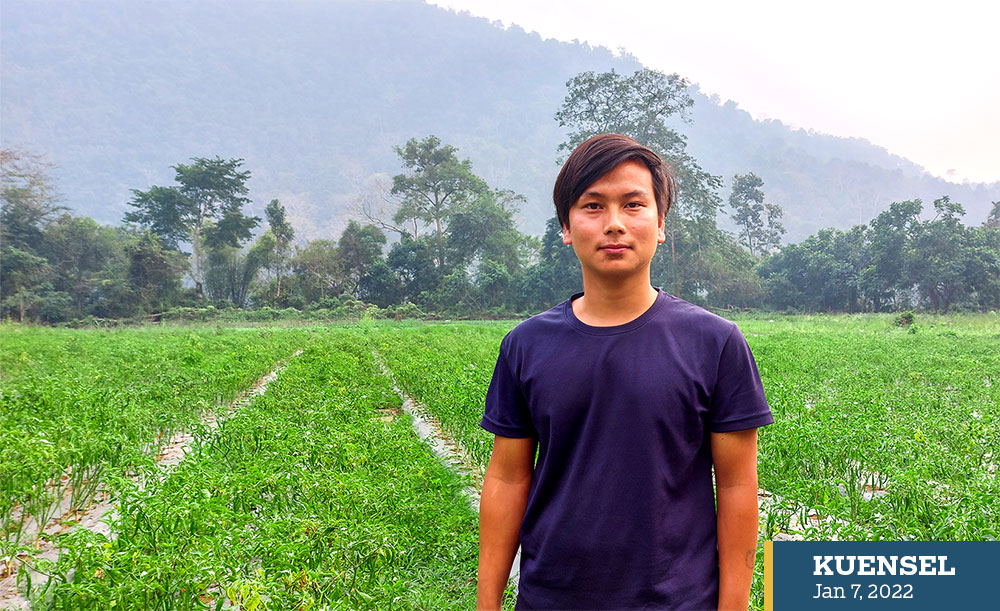Choki Wangmo | Dagana
Bimal Subba dropped out after Class X in 2019. He never wanted a public service job.
The same year he decided to drop out, he went to study diploma in marketing business for eight months in Singapore. He returned to his village in Samarchhu and started a commercial winter chilli farm on his parents’ 1.5-acre land.
“I always wanted to return home to my parents. They are supportive of my dreams,” said the 25-year-old.
He borrowed Nu 400,000 from the Loden Foundation for the venture. Tsendagang Gewog and the dzongkhag administration provided him farm equipment and other resources.
From his first harvest, he earned Nu 500,000. He was determined to increase his production. He was soon joined by his two younger brothers Novin Subba, 21, and Santaman Subba, 23. In two years, he paid 50 percent of his loan.
Last year, the three brothers leased a five-acre land from the government. Under the brand name “Brothers’ Sustainable and Natural Delight”, the young men are progressive youth of Samarchu chiwog in Dagana.
Today, theirs is a model farm in the chiwog. It is electric fenced, has five greenhouses, a harvesting shed, and rain harvesting facilities. Soon, the farm will be equipped with smart irrigation.
They use fertilisers from the poultry farm.
Except for the youngest sister, everyone is busy in the farm. The three brothers have divided the role. Bimal is the overall manager and plays an important role in bringing new ideas by attending training within and outside the country. The two brothers take turns transporting produce to market and marketing in other dzongkhags.
Marketing has become a challenge and the farmgate price for the chilli has dropped. “We are not asking the government to totally ban imported vegetables, but for those who are into winter vegetable cultivation, we need marketing support,” said Bimal.
From November to December last year, they harvested more than 900 kgs of winter chillies. They barely get Nu 100 for a kg. In the past, the demand for winter chillies soared and the market was lucrative.
“I get discouraged to see our hard work rot in the fields,” he added.
The young men are hopeful. They want to start a cassava powder factory within the farm. The National Post Harvest Centre supported them with drying machines.
They are also proposing to run the ecotourism site in Baragumti once it is operational in the future.
The site was identified as one of the potential ecotourism sites recently. With nine villages— Dharay, Gabring, Peeping, Dovan, Gariti, Dumla, Baragumti, and Samakhola—Samarchhu Chiwog shares border with Omchhu Chiwog in Nichula gewog. The 26 households in the chiwog depend on cassava, millet, areca nut, and winter chillies.
As the site along Punatsangchhu is a breeding ground for the endangered White-bellied Heron, the Royal Society for Protection of Nature has supported the group with farm inputs through the livelihood programmes.
Villagers say that the area is blessed with rich nature. The area could be developed around two ox-bow lakes in Baragumti with cycling tracks, birdwatching spots, camping, hiking trails, and other recreational activities.
Road connectivity in the chiwog is a major challenge in the monsoon, however. The 16km farm road is yet to be blacktopped. Residents say that during monsoon, the temporary motorable bridge is washed away and a suspension bridge at Gabring is the sole thoroughfare.
“We have to carry farm produce on foot and walk for 6km till the bridgepoint,” said a farmer from the chiwog.
Conflict with wild deer and elephant is also rampant in the area.
But Bimal Subba is there to stay.


